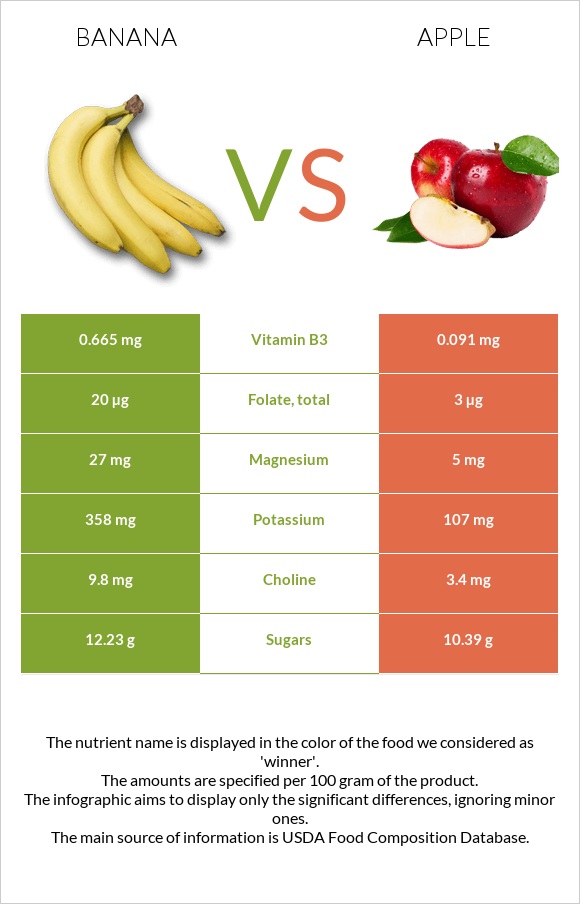Banana vs. Apple — In-Depth Nutrition Comparison
Compare
Summary of differences between bananas and apples
- The amount of vitamin B6, manganese, potassium, copper, vitamin B5, and magnesium in bananas is higher than in apples.
- Bananas cover your daily need for vitamin B6, 25% more than apples.
- Bananas contain 8 times more manganese than apples. While bananas contain 0.27mg of manganese, apples contain only 0.035mg.
- The amount of sugar in apples is lower.
- Apples have a lower glycemic index. The glycemic index of apples is 36, while the glycemic index of bananas is 48.
These are the specific foods used in this comparison Bananas, raw and Apples, raw, with skin.
Infographic

Infographic link
Mineral Comparison
Mineral comparison score is based on the number of minerals by which one or the other food is richer. The "coverage" charts below show how much of the daily needs can be covered by 300 grams of the food.
| Contains more MagnesiumMagnesium | +440% |
| Contains more PotassiumPotassium | +234.6% |
| Contains more IronIron | +116.7% |
| Contains more CopperCopper | +188.9% |
| Contains more ZincZinc | +275% |
| Contains more PhosphorusPhosphorus | +100% |
| Contains more ManganeseManganese | +671.4% |
| Contains more SeleniumSelenium | +∞% |
| Contains more CalciumCalcium | +20% |
Vitamin Comparison
Vitamin comparison score is based on the number of vitamins by which one or the other food is richer. The "coverage" charts below show how much of the daily needs can be covered by 300 grams of the food.
| Contains more Vitamin CVitamin C | +89.1% |
| Contains more Vitamin B1Vitamin B1 | +82.4% |
| Contains more Vitamin B2Vitamin B2 | +180.8% |
| Contains more Vitamin B3Vitamin B3 | +630.8% |
| Contains more Vitamin B5Vitamin B5 | +447.5% |
| Contains more Vitamin B6Vitamin B6 | +795.1% |
| Contains more FolateFolate | +566.7% |
| Contains more Vitamin EVitamin E | +80% |
| Contains more Vitamin KVitamin K | +340% |
All nutrients comparison - raw data values
| Nutrient |  |
 |
DV% diff. |
| Vitamin B6 | 0.367mg | 0.041mg | 25% |
| Manganese | 0.27mg | 0.035mg | 10% |
| Potassium | 358mg | 107mg | 7% |
| Copper | 0.078mg | 0.027mg | 6% |
| Vitamin C | 8.7mg | 4.6mg | 5% |
| Magnesium | 27mg | 5mg | 5% |
| Vitamin B5 | 0.334mg | 0.061mg | 5% |
| Vitamin B2 | 0.073mg | 0.026mg | 4% |
| Vitamin B3 | 0.665mg | 0.091mg | 4% |
| Folate | 20µg | 3µg | 4% |
| Carbs | 22.84g | 13.81g | 3% |
| Calories | 89kcal | 52kcal | 2% |
| Protein | 1.09g | 0.26g | 2% |
| Iron | 0.26mg | 0.12mg | 2% |
| Starch | 5.38g | 0.05g | 2% |
| Phosphorus | 22mg | 11mg | 2% |
| Selenium | 1µg | 0µg | 2% |
| Fiber | 2.6g | 2.4g | 1% |
| Zinc | 0.15mg | 0.04mg | 1% |
| Vitamin E | 0.1mg | 0.18mg | 1% |
| Vitamin B1 | 0.031mg | 0.017mg | 1% |
| Vitamin K | 0.5µg | 2.2µg | 1% |
| Choline | 9.8mg | 3.4mg | 1% |
| Fructose | 4.85g | 5.9g | 1% |
| Fats | 0.33g | 0.17g | 0% |
| Net carbs | 20.24g | 11.41g | N/A |
| Calcium | 5mg | 6mg | 0% |
| Sugar | 12.23g | 10.39g | N/A |
| Sodium | 1mg | 1mg | 0% |
| Vitamin A | 3µg | 3µg | 0% |
| Saturated fat | 0.112g | 0.028g | 0% |
| Monounsaturated fat | 0.032g | 0.007g | 0% |
| Polyunsaturated fat | 0.073g | 0.051g | 0% |
| Tryptophan | 0.009mg | 0.001mg | 0% |
| Threonine | 0.028mg | 0.006mg | 0% |
| Isoleucine | 0.028mg | 0.006mg | 0% |
| Leucine | 0.068mg | 0.013mg | 0% |
| Lysine | 0.05mg | 0.012mg | 0% |
| Methionine | 0.008mg | 0.001mg | 0% |
| Phenylalanine | 0.049mg | 0.006mg | 0% |
| Valine | 0.047mg | 0.012mg | 0% |
| Histidine | 0.077mg | 0.005mg | 0% |
Macronutrient Comparison
Macronutrient breakdown side-by-side comparison
| Contains more ProteinProtein | +319.2% |
| Contains more FatsFats | +94.1% |
| Contains more CarbsCarbs | +65.4% |
| Contains more OtherOther | +315% |
| Contains more WaterWater | +14.2% |
Fat Type Comparison
Fat type breakdown side-by-side comparison
| Contains more Mono. FatMonounsaturated fat | +357.1% |
| Contains more Poly. FatPolyunsaturated fat | +43.1% |
| Contains less Sat. FatSaturated fat | -75% |
Carbohydrate type comparison
Carbohydrate type breakdown side-by-side comparison
| Contains more StarchStarch | +10660% |
| Contains more SucroseSucrose | +15.5% |
| Contains more GlucoseGlucose | +104.9% |
| Contains more MaltoseMaltose | +∞% |
| Contains more FructoseFructose | +21.6% |
~equal in
Lactose
~0g
~equal in
Galactose
~0g



